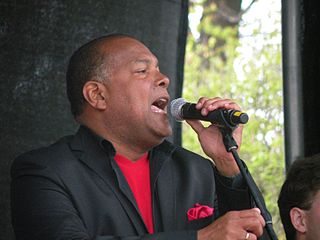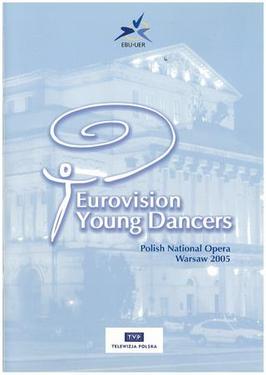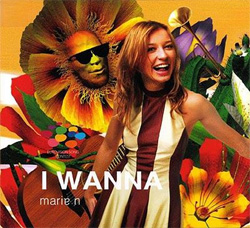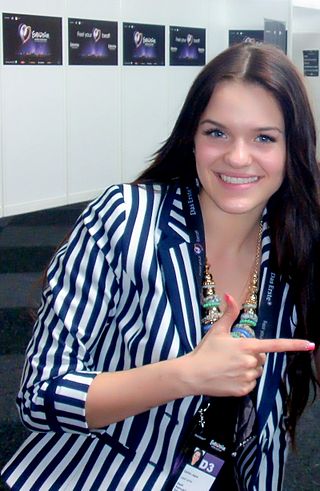
Dave Benton is a pop musician from Aruba who lives in Estonia. He is one of the winners of the Eurovision Song Contest 2001. At the age of 50 years and 101 days at the time of his victory, Benton is the oldest singer ever to win Eurovision.

Estonia has participated in the Eurovision Song Contest 28 times since making its debut in 1994. Its first appearance would have taken place in 1993 but a qualification round was installed for seven former Eastern Bloc countries hoping to make their debut in the contest, with Estonia failing to qualify. Estonia has won the contest once, in 2001.

The Eurovision Young Dancers 2005 was the eleventh edition of the Eurovision Young Dancers, held at the National Theatre in Warsaw, Poland on 24 June 2005. Organised by the European Broadcasting Union (EBU) and host broadcaster Telewizja Polska (TVP), dancers from ten countries participated in the televised final. A total of thirteen countries took part in the competition. For this contest, a week of dance master classes replaced the semi-final round in order to select the finalists. Armenia, Estonia, Switzerland and Ukraine decided not to participate.
Estonia participated in the Eurovision Song Contest 2007 with the song "Partners in Crime" written by Berit Veiber and Hendrik Sal-Saller. The song was performed by Gerli Padar. The Estonian broadcaster Eesti Televisioon (ETV) organised the national final Eurolaul 2007 in order to select the Estonian entry for the 2007 contest in Helsinki, Finland. Ten songs competed in the national final and the winner was selected over two rounds of public voting. In the first round, the top three were selected to qualify to the superfinal. In the superfinal, "Partners in Crime" performed by Gerli Padar was selected as the winner.

"I Wanna", also known in its original version as "I Wonna", was the winning song in the Eurovision Song Contest 2002 performed in English by Marie N representing Latvia. With this victory, Latvia became the second Baltic state to win the contest.

Maian-Anna Kärmas is an Estonian singer, songwriter, and journalist.

Getter Jaani is an Estonian singer and actress. She represented Estonia in the Eurovision Song Contest 2011 with the song "Rockefeller Street".

Sweden has participated in the biennial classical music competition Eurovision Young Musicians 13 times since its debut in 1986, winning the contest for the first time in 2006. Sweden are yet to host the contest.

Portugal has participated in the biennial classical music competition Eurovision Young Musicians 4 times since its debut in 1990 and are yet to receive a top 3 placing in any contest. Portugal hosted the contest in 1996. Portugal previously attempted to take part in 1986, but were forced to withdraw as it had been unable to provide a "qualified candidate".

Estonia has participated in the biennial classical music competition Eurovision Young Musicians six times since its debut in 1994, most recently taking part in 2018. The country's best result is a third-place finish in 1996.

Sweden has participated in the Eurovision Young Dancers 15 times since its debut in 1985. Sweden has hosted the contest once, in 1993 and jointly won the contest in 2003. Sweden is also the only country that has participated in every edition.

Malta has participated in the Eurovision Young Dancers 2 times since its debut in 2015. On 7 July 2015, PBS Malta, which is responsible for Malta's participation confirmed that Malta will host the 2017 edition. However, in January 2017, the EBU announced that PBS had due to circumstances beyond their control been forced to cancel their staging of the competition. Nevertheless, they will still take part in the contest.

Spain has participated in the Eurovision Young Dancers eight times since its debut in 1985, most recently taking part in 1999. Spain is the most successful country in the contest, with a total of five wins.

Germany has participated in the Eurovision Young Dancers 13 times since its debut in 1985. Germany has hosted the contest once, in 1987. Before German reunification in 1990, it was presented as West Germany, representing the Federal Republic of Germany. East Germany did not compete.

Poland has participated in the Eurovision Young Dancers 11 times since its debut in 1993. Poland has hosted the contest a record three times, in 1997, 2005 and 2013, and has won the contest three times. On 5 September 2016, Polish broadcaster Telewizja Polska (TVP) confirmed they would participate again in 2017.

Denmark has participated in the Eurovision Young Dancers 4 times since its debut in 1987.

The United Kingdom has participated in the Eurovision Young Dancers 7 times since its debut in 1985, most recently taking part in 2005. The UK has hosted the contest once, in 2001 and jointly won the contest in 1989.

Switzerland has participated in the Eurovision Young Dancers 9 times since its debut in 1985. Switzerland has hosted the contest once, in 1995.

Rasmus Simon Rändvee is an Estonian singer. He is best known for winning the fifth season of Eesti otsib superstaari.

"The Lucky One" is a song performed by Estonian singer Uku Suviste that represented Estonia in the Eurovision Song Contest 2021. The backing vocalist off-stage during Suviste's live performance at the Eurovision was Kaarel Orumägi.

















